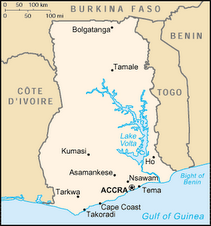This week thirty new physicians graduated from the medical school here in Tamale, an equal number of men and women. They now have a license to learn. For the past few weeks, my lecturing, writing exam questions, and testing of the students’ clinical skills - all while caring for patients at the hospital - has kept me very busy. Their answers showed me where to put more emphasis next year. It is satisfying and I am proud of my part, but I am glad it is over.
Two children recently presented having had coins in their esophagus for four months. The children originally went to their local hospitals where they were told the coins would spontaneously pass. After four months of losing weight, coughing and chest pain, x-rays were taken which showed the continued presence of the coins and they were referred to Tamale. We successfully removed the coins from grossly inflamed esophaguses.
Working in a different culture is difficult. “Instant justice” is practiced here. Two of my patients were caught stealing goats and were immediately beaten and unsuccessfully hung. I cannot reduce one’s fractured mandible because he has a collapsed lung and the other is just regaining consciousness. Because of this tradition of “instant justice,” it is strongly recommended that if a person happens to injure a pedestrian while driving, one should not stop even to offer assistance, but rather continue on to report it at the nearest police station.
Two children recently presented having had coins in their esophagus for four months. The children originally went to their local hospitals where they were told the coins would spontaneously pass. After four months of losing weight, coughing and chest pain, x-rays were taken which showed the continued presence of the coins and they were referred to Tamale. We successfully removed the coins from grossly inflamed esophaguses.
Working in a different culture is difficult. “Instant justice” is practiced here. Two of my patients were caught stealing goats and were immediately beaten and unsuccessfully hung. I cannot reduce one’s fractured mandible because he has a collapsed lung and the other is just regaining consciousness. Because of this tradition of “instant justice,” it is strongly recommended that if a person happens to injure a pedestrian while driving, one should not stop even to offer assistance, but rather continue on to report it at the nearest police station.

